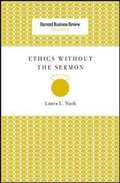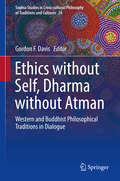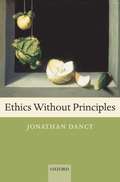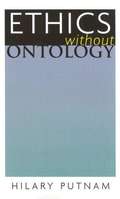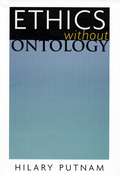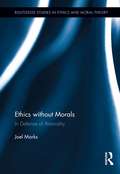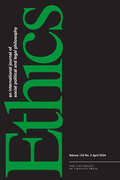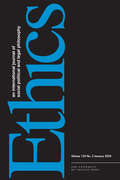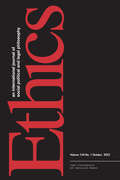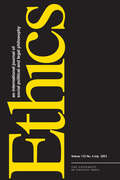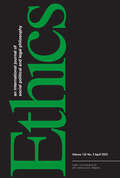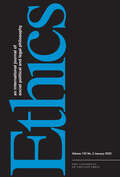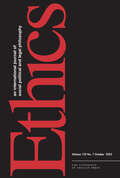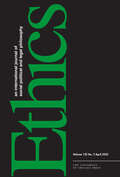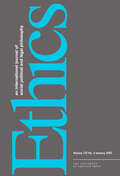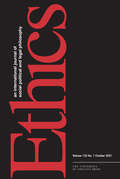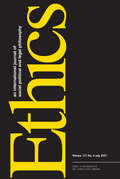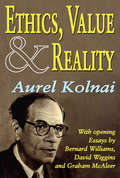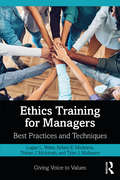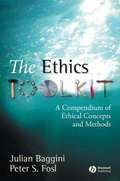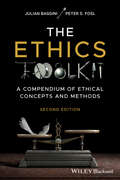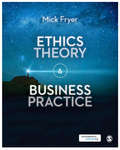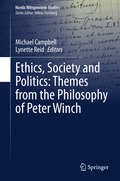- Table View
- List View
Ethics Without the Sermon
by Laura L. NashA set of twelve questions provides executives with a framework to test pragmatically the ethical content of business decisions. The inquiry draws on traditional philosophical frameworks while avoiding the utopian and anticapitalistic bias prevalent in current applied business philosophy. The ethical inquiry method articulates corporate responsibilities and lays them open for examination.
Ethics without Self, Dharma without Atman: Western and Buddhist Philosophical Traditions in Dialogue (Sophia Studies in Cross-cultural Philosophy of Traditions and Cultures #24)
by Gordon F. DavisThis volume of essays offers direct comparisons of historic Western and Buddhist perspectives on ethics and metaphysics, tracing parallels and contrasts all the way from Plato to the Stoics, Spinoza to Hume, and Schopenhauer through to contemporary ethicists such as Arne Naess, Charles Taylor and Derek Parfit. It compares and contrasts each Western philosopher with a particular strand in the Buddhist tradition, in some chapters represented by individual writers such as Nagarjuna, Vasubandhu, Santideva or Tsong Khapa. It does so in light of both analytic concerns and themes from the existentialist and phenomenological traditions, and often in an ecumenical spirit that bridges both analytic and continentalist approaches. Some of the deepest questions in ethics, dealing with the scope of agency, value-laden notions of personhood and the nature of value in general, are intertwined with questions in metaphysics. One set of questions addresses how varying conceptions of selfhood relate to moral values (e.g. the concern of self or selves for the well-being of others); another set of questions addresses how a conception of oneself or one’s selves should or should not affect how one thinks of happiness, or eudaimonia, or – in classical Indian terms – artha, sukha or nirvana. Western philosophy has featured discussion of both, but some would argue that certain traditions of Asian philosophy have offered a more sustained and even treatment of both sets of questions. The Buddhist tradition in particular has not only featured much discussion on both fronts, but has attracted many contemporary philosophers to its distinctive spectrum of approaches, and to what is – from many ‘Western’ points of view – a seemingly subversive analysis of ego, selfhood and personhood, whether in metaphysical, phenomenological or other incarnations.
Ethics Without Principles
by Jonathan DancyJonathan Dancy presents a long-awaited exposition and defence of particularism in ethics, a view with which he has been associated for twenty years. He argues that the traditional link between morality and principles, or between being moral and having principles, is little more than a mistake. The possibility of moral thought and judgement does not in any way depend on an adequate supply of principles. Dancy grounds this claim on a form of reasons-holism, holding that what is a reason in one case need not be any reason in another, and maintaining that moral reasons are no different inthis respect from others. He puts forward a distinctive form of value-holism to go with the holism of reasons, and he gives a detailed discussion, much needed, of the currently popular topic of 'contributory' reasons. Opposing positions of all sorts are summarized and criticized. Ethics Without Principles is the definitive statement of particularist ethical theory, and will be required reading for all those working on moral philosophy and ethical theory.
Ethics Without Ontology
by Hilary PutnamIn this brief book one of the most distinguished living American philosophers takes up the question of whether ethical judgments can properly be considered objective--a question that has vexed philosophers over the past century. Looking at the efforts of philosophers from the Enlightenment through the twentieth century, Putnam traces the ways in which ethical problems arise in a historical context. Hilary Putnam's central concern is ontology--indeed, the very idea of ontology as the division of philosophy concerned with what (ultimately) exists. Reviewing what he deems the disastrous consequences of ontology's influence on analytic philosophy--in particular, the contortions it imposes upon debates about the objective of ethical judgments--Putnam proposes abandoning the very idea of ontology. He argues persuasively that the attempt to provide an ontological explanation of the objectivity of either mathematics or ethics is, in fact, an attempt to provide justifications that are extraneous to mathematics and ethics--and is thus deeply misguided.
Ethics without Ontology
by Hilary PutnamIn this brief book one of the most distinguished living American philosophers takes up the question of whether ethical judgments can properly be considered objective--a question that has vexed philosophers over the past century. Looking at the efforts of philosophers from the Enlightenment through the twentieth century, Putnam traces the ways in which ethical problems arise in a historical context. Hilary Putnam's central concern is ontology--indeed, the very idea of ontology as the division of philosophy concerned with what (ultimately) exists. Reviewing what he deems the disastrous consequences of ontology's influence on analytic philosophy--in particular, the contortions it imposes upon debates about the objective of ethical judgments--Putnam proposes abandoning the very idea of ontology. He argues persuasively that the attempt to provide an ontological explanation of the objectivity of either mathematics or ethics is, in fact, an attempt to provide justifications that are extraneous to mathematics and ethics--and is thus deeply misguided.
Ethics without Morals: In Defence of Amorality (Routledge Studies in Ethics and Moral Theory)
by Joel MarksIn this volume, Marks offers a defense of amorality as both philosophically justified and practicably livable. In so doing, the book marks a radical departure from both the new atheism and the mainstream of modern ethical philosophy. While in synch with their underlying aim of grounding human existence in a naturalistic metaphysics, the book takes both to task for maintaining a complacent embrace of morality. Marks advocates wiping the slate clean of outdated connotations by replacing the language of morality with a language of desire. The book begins with an analysis of what morality is and then argues that the concept is not instantiated in reality. Following this, the question of belief in morality is addressed: How would human life be affected if we accepted that morality does not exist? Marks argues that at the very least, a moralist would have little to complain about in an amoral world, and at best we might hope for a world that was more to our liking overall. An extended look at the human encounter with nonhuman animals serves as an illustration of amorality’s potential to make both theoretical and practical headway in resolving heretofore intractable ethical problems.
Ethics with Aristotle
by Sarah BroadieSarah Broadie gives an argued account of the main topics of Aristotle's ethics: eudaimonia, virtue, voluntary agency, practical reason, akrasia, pleasure, and the ethical status of theoria. She explores the sense of "eudaimonia," probes Aristotle's division of the soul and its virtues, and traces the ambiguities in "voluntary."
Ethics, volume 134 number 3 (April 2024)
by EthicsThis is volume 134 issue 3 of Ethics. Ethics features scholarly work that covers a range of topics pertaining to moral, political, and legal philosophy from a variety of intellectual perspectives, including social and political theory, law, and economics. Articles in the journal present new theories, apply theory to contemporary moral issues, and focus on historical works that have significant implications for contemporary theory. In addition to major articles, Ethics publishes critical discussions, symposia, review essays, and book reviews.
Ethics, volume 134 number 2 (January 2024)
by EthicsThis is volume 134 issue 2 of Ethics. Ethics features scholarly work that covers a range of topics pertaining to moral, political, and legal philosophy from a variety of intellectual perspectives, including social and political theory, law, and economics. Articles in the journal present new theories, apply theory to contemporary moral issues, and focus on historical works that have significant implications for contemporary theory. In addition to major articles, Ethics publishes critical discussions, symposia, review essays, and book reviews.
Ethics, volume 134 number 1 (October 2023)
by EthicsThis is volume 134 issue 1 of Ethics. Ethics features scholarly work that covers a range of topics pertaining to moral, political, and legal philosophy from a variety of intellectual perspectives, including social and political theory, law, and economics. Articles in the journal present new theories, apply theory to contemporary moral issues, and focus on historical works that have significant implications for contemporary theory. In addition to major articles, Ethics publishes critical discussions, symposia, review essays, and book reviews.
Ethics, volume 133 number 4 (July 2023)
by EthicsThis is volume 133 issue 4 of Ethics. Ethics features scholarly work that covers a range of topics pertaining to moral, political, and legal philosophy from a variety of intellectual perspectives, including social and political theory, law, and economics. Articles in the journal present new theories, apply theory to contemporary moral issues, and focus on historical works that have significant implications for contemporary theory. In addition to major articles, Ethics publishes critical discussions, symposia, review essays, and book reviews.
Ethics, volume 133 number 3 (April 2023)
by EthicsThis is volume 133 issue 3 of Ethics. Ethics features scholarly work that covers a range of topics pertaining to moral, political, and legal philosophy from a variety of intellectual perspectives, including social and political theory, law, and economics. Articles in the journal present new theories, apply theory to contemporary moral issues, and focus on historical works that have significant implications for contemporary theory. In addition to major articles, Ethics publishes critical discussions, symposia, review essays, and book reviews.
Ethics, volume 133 number 2 (January 2023)
by EthicsThis is volume 133 issue 2 of Ethics. Ethics features scholarly work that covers a range of topics pertaining to moral, political, and legal philosophy from a variety of intellectual perspectives, including social and political theory, law, and economics. Articles in the journal present new theories, apply theory to contemporary moral issues, and focus on historical works that have significant implications for contemporary theory. In addition to major articles, Ethics publishes critical discussions, symposia, review essays, and book reviews.
Ethics, volume 133 number 1 (October 2022)
by EthicsThis is volume 133 issue 1 of Ethics. Ethics features scholarly work that covers a range of topics pertaining to moral, political, and legal philosophy from a variety of intellectual perspectives, including social and political theory, law, and economics. Articles in the journal present new theories, apply theory to contemporary moral issues, and focus on historical works that have significant implications for contemporary theory. In addition to major articles, Ethics publishes critical discussions, symposia, review essays, and book reviews.
Ethics, volume 132 number 3 (April 2022)
by EthicsThis is volume 132 issue 3 of Ethics. Ethics features scholarly work that covers a range of topics pertaining to moral, political, and legal philosophy from a variety of intellectual perspectives, including social and political theory, law, and economics. Articles in the journal present new theories, apply theory to contemporary moral issues, and focus on historical works that have significant implications for contemporary theory. In addition to major articles, Ethics publishes critical discussions, symposia, review essays, and book reviews.
Ethics, volume 132 number 2 (January 2022)
by EthicsThis is volume 132 issue 2 of Ethics. Ethics features scholarly work that covers a range of topics pertaining to moral, political, and legal philosophy from a variety of intellectual perspectives, including social and political theory, law, and economics. Articles in the journal present new theories, apply theory to contemporary moral issues, and focus on historical works that have significant implications for contemporary theory. In addition to major articles, Ethics publishes critical discussions, symposia, review essays, and book reviews.
Ethics, volume 132 number 1 (October 2021)
by EthicsThis is volume 132 issue 1 of Ethics. Ethics features scholarly work that covers a range of topics pertaining to moral, political, and legal philosophy from a variety of intellectual perspectives, including social and political theory, law, and economics. Articles in the journal present new theories, apply theory to contemporary moral issues, and focus on historical works that have significant implications for contemporary theory. In addition to major articles, Ethics publishes critical discussions, symposia, review essays, and book reviews.
Ethics, volume 131 number 4 (July 2021)
by EthicsThis is volume 131 issue 4 of Ethics. Ethics features scholarly work that covers a range of topics pertaining to moral, political, and legal philosophy from a variety of intellectual perspectives, including social and political theory, law, and economics. Articles in the journal present new theories, apply theory to contemporary moral issues, and focus on historical works that have significant implications for contemporary theory. In addition to major articles, Ethics publishes critical discussions, symposia, review essays, and book reviews.
Ethics, Value, and Reality: Selected Papers Of Aurel Kolnai
by Aurel KolnaiEthics, Value, and Reality is a collection of essays written after Kolnai settled in England in 1955. These essays from Kolnai's mature years sit atop a remarkable gestation of moral and political thinking. At the heart of his thought is the special role of privilege in a good social order. Kolnai relies heavily on the work of late nineteenth- and early twentieth-century value theorists such as Alexius Meinong, Nicolai Hartmann, and Max Scheler. He blends this continental tradition of ethics with British intuitionism and Scottish Enlightenment articulations.For Kolnai, ethical life cannot be adequately understood except by reference to moral emphasis, and thus, Kolnai can be thought of as a liberal conservative. He acknowledges myriad values, moral and non-moral, and accepts that all can have some claim upon us. Low values as much as high values have a legitimate claim. His is a tolerant conservatism though not for a moment does he forgo the necessity of judgment: a readily graspable hierarchy keeps the respective demands of values in proportion. Kolnai welcomes the call to seriousness, which is the hallmark of existentialism.The ground of Kolnai's thought is the idea of emotion as cognitive. He saw the typical analytical philosopher's fascination with simplicity of explanation not only thoroughly refuted by the gains in understanding wrought by phenomenological method, with its deference to the richness of phenomena, but sensed in the monistic inclination he dreaded a harbinger of totalitarianism. Never denying his emotionalism, he nonetheless made his points well enough by adopting an analytical approach to philosophy and ethics. This is a major work crossing moral and political philosophy.
Ethics Training for Managers: Best Practice and Techniques (Giving Voice to Values)
by Logan L. Watts Kelsey Medeiros Tristan McIntosh Tyler MulhearnCan employees be trained to make more ethical decisions? If so, how? Providing evidence-based and practical answers to these critical questions is the purpose of this book. To answer these questions, the authors—four organizational psychologists who specialize in the study of ethical decision making—translate insights based on decades of scientific research. Whether you are a student, educator, HR manager, compliance professional, or simply someone interested in the topic of ethics education, this book offers a road map for designing ethics training programs that work.
The Ethics Toolkit: A Compendium Of Ethical Concepts And Methods
by Julian Baggini Peter S. FoslThe Ethics Toolkit provides an accessible and engaging compendium of concepts, theories, and strategies that encourage students and advanced readers to think critically about ethics so that they can engage intelligently in ethical study, thought, and debate. Written by the authors of the popular The Philosophers' Toolkit (Blackwell, 2001); Baggini is also a renowned print and broadcast journalist, and a prolific author of popular philosophy books Uses clear and accessible language appropriate for use both inside and beyond the classroom Enlivened through the use of real-world and hypothetical examples Cross-referencing of entries helps to connect and contrast ideas Features lists of prominent ethics organizations and useful websites Encourages readers to think critically about ethics and teaches them how to engage intelligently in ethical study, thought, and debate
The Ethics Toolkit: A Compendium of Ethical Concepts and Methods
by Julian Baggini Peter S. FoslA new edition of the bestselling guide which equips readers with the skills necessary for engaging in ethical reflection The Ethics Toolkit offers an engaging and approachable introduction to the core concepts, principles, and methods of contemporary ethics. Explaining to students and general readers how to think critically about ethics and actually use philosophical concepts, this innovative volume provides the tools and knowledge required to engage intelligently in ethical study, deliberation, and debate. Invaluable as both a complete guide and a handy reference, this versatile resource provides clear and authoritative information on a diverse range of topics, from fundamental concepts and major ethical frameworks to contemporary critiques and ongoing debates. Throughout the text, Fosl and Baggini highlight the crucial role ethics plays in our lives, exploring autonomy, free will, consciousness, fairness, responsibility, consent, intersectionality, sex and gender, and much more. Substantially revised and expanded, the second edition of The Ethics Toolkit contains a wealth of new entries, new recommended readings, more detailed textual references, and numerous timely real-world and hypothetical examples. Uses clear and accessible language appropriate for use inside and beyond the classroom Contains cross-referenced entries to help readers connect and contrast ideas Engages both non-Western and Western philosophy Offer insights into key issues in ethics with a firm grounding in the history of philosophy Includes an appendix of tools for the practice of ethics, including links to podcasts, web and print resources, and prominent ethics organizations Written by the authors of the popular The Philosophers’ Toolkit, this new edition of The Ethics Toolkit is a must-have resource for anyone interested in ethics, from general readers to undergraduate and graduate students.
Ethics Theory and Business Practice
by Mick FryerIn his ground-breaking new textbook, Mick Fryer offers students of Business Ethics clear explanations of a range of theoretical perspectives, along with examples of how these perspectives might be used to illuminate the ethical challenges presented by business practice. The book includes: Realistic scenarios which gently introduce a theory and demonstrate how it can be applied to a real-life ethical dilemma that everyone can relate to, such as borrowing money from a friend Real organisational case studies in each chapter which illustrate how each theory can be applied to real business situations. Cases include Nike, Coca Cola, BMW, Shell, Starbucks and GSK ‘Pause for Reflection’ boxes and ‘Discussion Questions’ which encourage you to challenge the established notions of right and wrong, and empower you to develop your own moral code Video Activities in each chapter with accompanying QR codes which link to documentaries, films, debates and news items to get you thinking about real-life ethical dilemmas Visit the book’s companion website for self-test questions, additional web links and more at: study.sagepub.com/fryer
Ethics Theory and Business Practice
by Mick FryerIn his ground-breaking new textbook, Mick Fryer offers students of Business Ethics clear explanations of a range of theoretical perspectives, along with examples of how these perspectives might be used to illuminate the ethical challenges presented by business practice. The book includes: Realistic scenarios which gently introduce a theory and demonstrate how it can be applied to a real-life ethical dilemma that everyone can relate to, such as borrowing money from a friend Real organisational case studies in each chapter which illustrate how each theory can be applied to real business situations. Cases include Nike, Coca Cola, BMW, Shell, Starbucks and GSK 'Pause for Reflection' boxes and 'Discussion Questions' which encourage you to challenge the established notions of right and wrong, and empower you to develop your own moral code Video Activities in each chapter with accompanying QR codes which link to documentaries, films, debates and news items to get you thinking about real-life ethical dilemmas Visit the book's companion website for self-test questions, additional web links and more at: study.sagepub.com/fryer
Ethics, Society and Politics: Themes from the Philosophy of Peter Winch (Nordic Wittgenstein Studies #6)
by Michael Campbell Lynette ReidThis volume is a reappraisal of the work of Peter Guy Winch (1926 -1997), one of the most important philosophers of the 20th Century. Winch faded into relative obscurity compared to his contemporaries due to a mistaken belief that there are no systematic connections between the different aspects of his work. This volume corrects that presupposition and reintroduces Winch's work to a new generation of scholars. By showing how ethical, political and social issues are interrelated in Winch's work, and by making clear the connections between these issues and themes in metaphysics and the philosophy of mind, the volume demonstrates both the breadth and the unity of Winch's approach. It discusses topics such as ethics, political philosophy, social science, the philosophy of action, the philosophy of mind, metaphysics, and the philosophy of language. Despite this apparent variety of topics, the contributors to the volume share Winch's conviction that the different areas of philosophy are interdependent. As a result, the volume as a whole shows unity in diversity and provides an example of a manner of philosophising in which different approaches and sub-disciplines are placed in dialogue with each other. Peter Guy Winch is most famous for his early work on the philosophy of the social sciences. His On the Idea of a Social Science and its Relation to Philosophy (ISS) generated controversy within both philosophical and social scientific circles. In that work and subsequent publications Winch argued against the presupposition that social relations could be understood using the conceptual tools of the natural sciences. Winch would later describe ISS as a 'young man's book' and would come to regret the reputation it garnered him - a mixture of roughly equal degrees fame and infamy. Alongside his work on the philosophy of social sciences, Winch was an interpreter and exegete of Wittgenstein. He also published a ground-breaking study of the philosophy of Simone Weil, entitled Simone Weil: The Just Balance. Winch also published numerous essays on issues in ethics, political philosophy and the philosophy of religion, and at his death was working on a book manuscript on the problem of political authority.
